Ruta de navegación
Menú de navegación
Blogs
Entries with label space .
![Insight into mineral extraction on an asteroid, from ExplainingTheFuture.com [Christopher Barnatt]. Insight into mineral extraction on an asteroid, from ExplainingTheFuture.com [Christopher Barnatt].](/documents/10174/16849987/gaj-foto-4.jpg)
▲ Vision for mineral extraction on an asteroid, from ExplainingTheFuture.com [Christopher Barnatt].
GLOBAL AFFAIRS JOURNAL / Mario Pereira
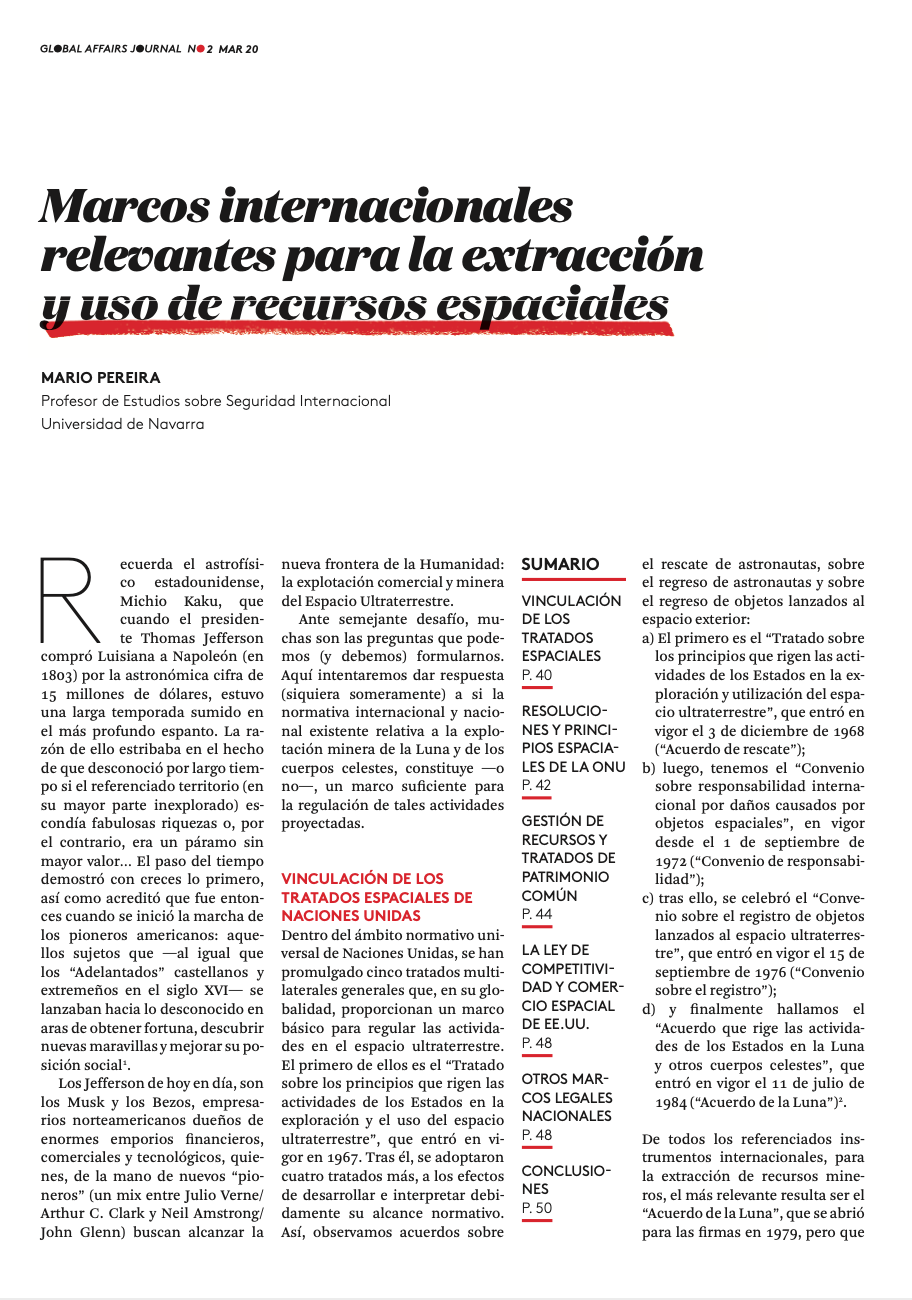 [14-page document. downloadin PDF]
[14-page document. downloadin PDF]
INTRODUCTION
The American astrophysicist Michio Kaku recalls that when President Thomas Jefferson bought Louisiana from Napoleon (in 1803) for the astronomical sum of 15 million dollars, he spent a long period of time in deep fear. The reason for this lay in the fact that he did not know for a long time whether the territory (mostly unexplored) hid fabulous riches or, on the contrary, was a worthless wasteland... The passage of time proved the former, as well as proving that it was then that the march of the American pioneers began: those people who - like the "Adelantados" of Castile and Extremadura in the 16th century - set out for the unknown in order to make their fortune, discover new wonders and improve their social position.
The Jeffersons of today are the Musks and the Bezos, American businessmen, owners of huge financial, commercial and technological empires, who, hand in hand with new "pioneers" (a mix between Jules Verne/Arthur C. Clark and Neil Armstrong/John Glenn) seek to reach the new frontier of Humanity: the commercial and mining exploitation of Outer Space.
Faced with such a challenge, many questions can (and should) be asked. Here we will try to answer (at least briefly) whether the existing international and national rules and regulations on the mining of the Moon and celestial bodies constitutes - or does not constitute - a sufficient framework for the regulation of such planned activities.
![proposal of a lunar base for obtaining helium, taken from ExplainingTheFuture.com [Christopher Barnatt]. proposal of a lunar base for obtaining helium, taken from ExplainingTheFuture.com [Christopher Barnatt].](/documents/10174/16849987/gaj-foto-3.jpg)
▲ proposal of a lunar base for obtaining helium, taken from ExplainingTheFuture.com [Christopher Barnatt].
GLOBAL AFFAIRS JOURNAL / Emili J. Blasco
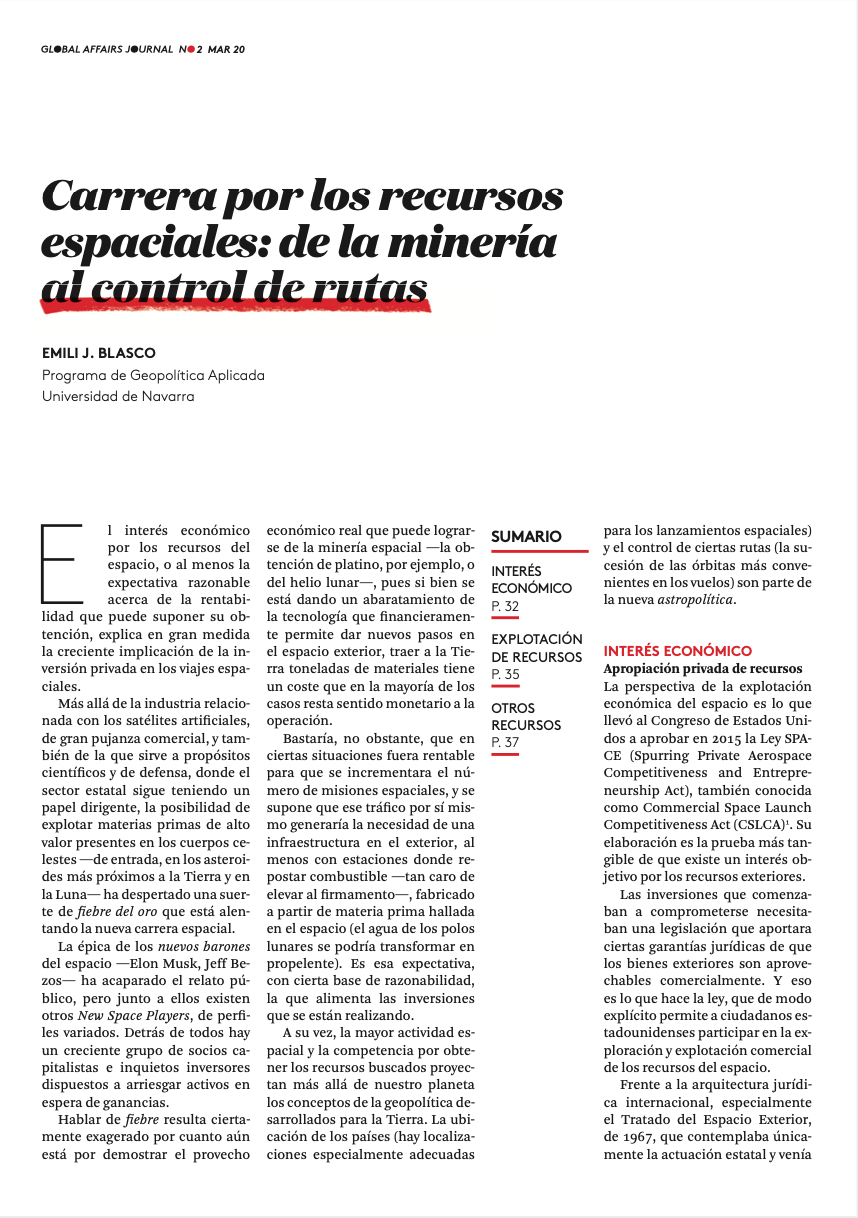 [8-page document. downloadin PDF]
[8-page document. downloadin PDF]
INTRODUCTION
The economic interest in space resources, or at least the reasonable expectation of the profitability of obtaining them, goes a long way to explaining the growing involvement of private investment in space travel.
Beyond the commercially strong artificial satellite industry, as well as those serving scientific and defence purposes, where the state sector continues to play a leading role, the possibility of exploiting high-value raw materials present on celestial bodies - from entrance, on the closest asteroids to the Earth and on the Moon - has awakened a kind of gold rush that is fuelling the new space degree program .
The epic of the new space barons - Elon Musk, Jeff Bezos - has captured the public narrative, but alongside them there are other New Space Players, with varied profiles. Behind them all is a growing group of equity partners and restless investors willing to risk assets in the hope of profit.
To talk of space mining fever is certainly exaggerated, as the real economic benefit to be gained from space mining - obtaining platinum, for example, or lunar helium - has yet to be demonstrated. While the technology is becoming cheaper, financially enabling new steps into outer space, bringing tons of materials back to Earth has a cost that in most cases makes the operation less financially meaningful.
It would be enough, however, that in certain situations it would be profitable to increase the number of space missions issue , and it is assumed that this traffic in itself would generate the need for an infrastructure abroad, at least with stations to refuel fuel - so expensive to lift into the sky - manufactured from subject raw materials found in space (the water at the lunar poles could be transformed into propellant). It is this expectation, with some basis in reasonableness, that is fuelling the investments being made.
In turn, increased space activity and the skill to obtain the resources sought project beyond our planet the concepts of geopolitics developed for Earth. The location of countries (there are particularly suitable locations for space launches) and the control of certain routes (the succession of the most convenient flight orbits) are part of the new astro-politics.
![In addition to the return to the Moon and Mars, asteroid travel programmes are also being accelerated [NASA]. In addition to the return to the Moon and Mars, asteroid travel programmes are also being accelerated [NASA].](/documents/10174/16849987/gaj-foto-1.jpg)
In addition to the return to the Moon and the arrival on Mars, asteroid travel programmes are also being accelerated [NASA].
GLOBAL AFFAIRS JOURNAL / Javier Gómez-Elvira
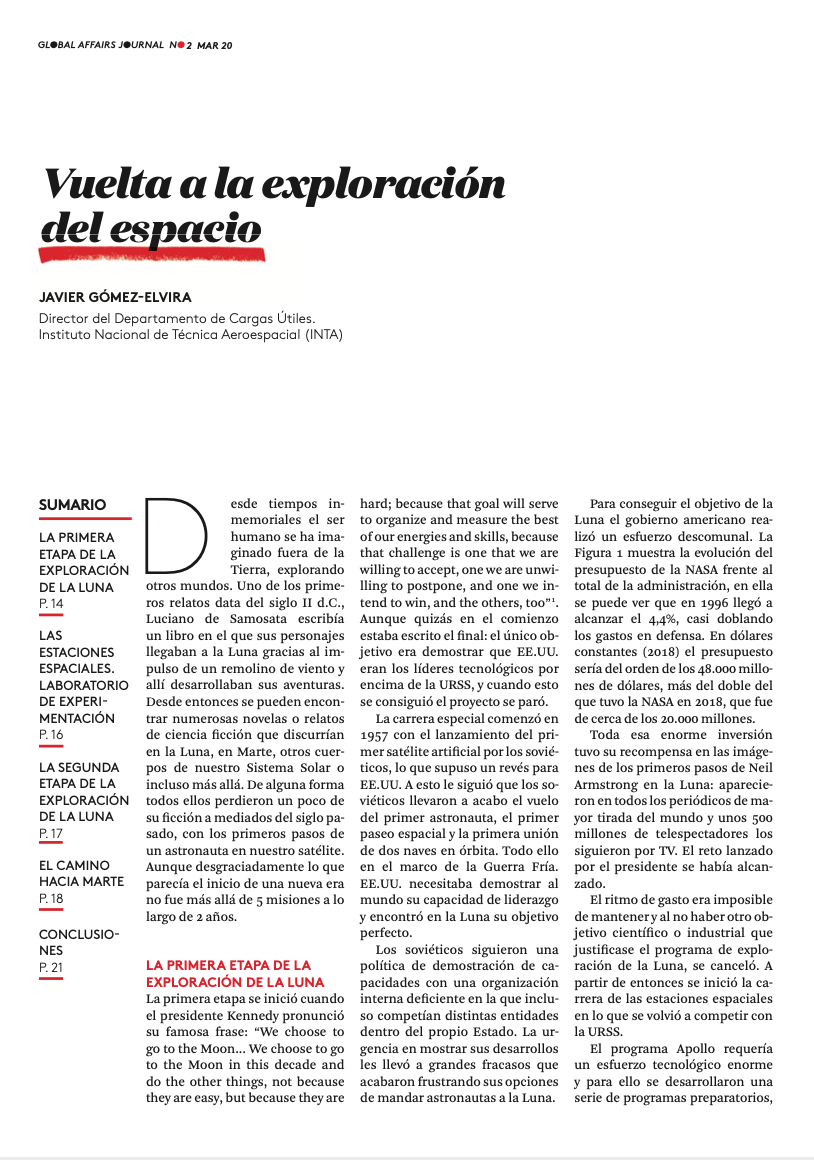 [8-page document. downloadin PDF]
[8-page document. downloadin PDF]
INTRODUCTION
Since time immemorial, human beings have imagined themselves outside the Earth, exploring other worlds. One of the first stories dates back to the 2nd century A.D. Lucian of Samosata wrote a book in which his characters reached the moon thanks to the impulse of a whirlwind and there they developed their adventures. Since then, one can find numerous science fiction novels or stories set on the Moon, on Mars, on other bodies in our Solar System or even beyond. Somehow they all lost a bit of their fiction in the middle of the last century, with the first steps of an astronaut on our satellite. Unfortunately, however, what seemed to be the beginning of a new era did not go beyond 5 missions over 2 years.
The first stage began when President Kennedy uttered his famous phrase: "We choose to go to the Moon.... We choose to go to the Moon in this decade and do the other things, not because they are easy, but because they are hard; because that goal will serve to organize and measure the best of our energies and skills, because that challenge is one that we are willing to accept, one we are unwilling to postpone, and one we intend to win, and the others, too". Although perhaps the end was written in the beginning: the only goal was to prove that the US was the technological leader over the USSR, and when this was achieved the project stopped.
![Scene about anchoring on an asteroid to develop mining activity, from ExplainingTheFuture.com [Christopher Barnatt]. Scene about anchoring on an asteroid to develop mining activity, from ExplainingTheFuture.com [Christopher Barnatt].](/documents/10174/16849987/gaj-foto-0.jpg)
Scene about anchoring on an asteroid to develop mining activity, from ExplainingTheFuture.com [Christopher Barnatt].
GLOBAL AFFAIRS JOURNAL / Emili J. Blasco
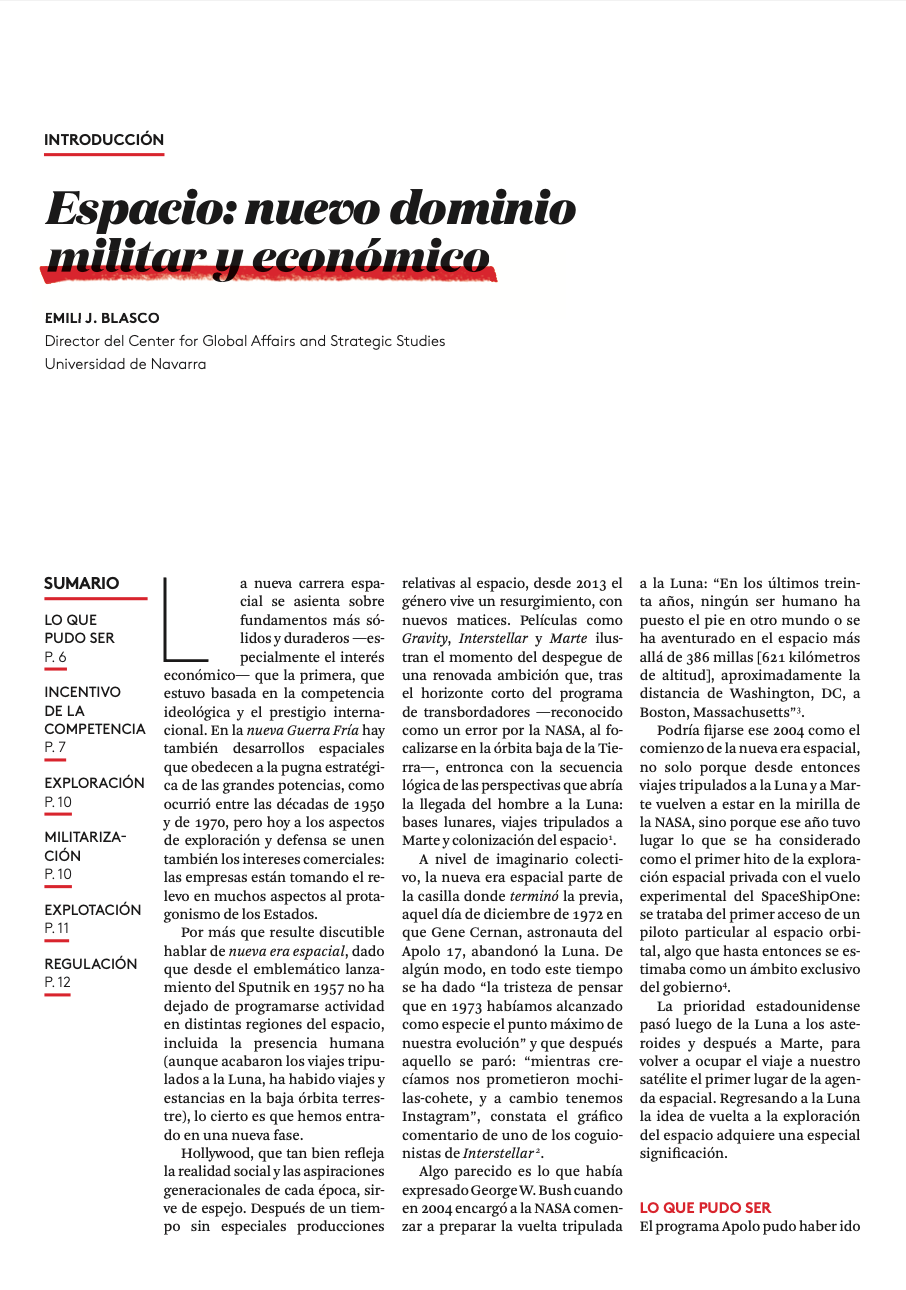 [8-page document. downloadin PDF]
[8-page document. downloadin PDF]
INTRODUCTION
The new space degree program is based on more solid and lasting foundations - especially economic interest - than the first one, which was based on ideological skill and international prestige. In the new Cold War there are also space developments that obey the strategic struggle of the great powers, as was the case between the 1950s and 1970s, but today the aspects of exploration and defence are joined by commercial interests: companies are taking over from states in many respects.
However debatable it may be to speak of a new space age, given that since the emblematic launch of Sputnik in 1957, there has been no end to scheduled activity in different regions of space, including human presence (although manned trips to the Moon have ended, there have been trips and stays in Earth's orbit leave ), the fact is that we have entered a new phase.
Hollywood, which so well reflects the social reality and generational aspirations of the times, serves as a mirror. After a time without special space-related productions, since 2013 the genre is experiencing a resurgence, with new nuances. Films such as Gravity, Interstellar and Mars illustrate the moment of take-off of a renewed ambition which, after the short horizon of the shuttle programme - acknowledged as a mistake by NASA, as it focused on the Earth's orbit leave -, is linked to the logical sequence of perspectives opened up by man's arrival on the Moon: instructions lunar, manned trips to Mars and the colonisation of space.
At the level of the collective imagination, the new space age starts from the square where the previous one "ended", that day in December 1972 when Gene Cernan, Apollo 17 astronaut, left the moon. Somehow, in all this time there has been "the sadness of thinking that in 1973 we had reached the peak of our evolution as a species" and that afterwards it stopped: "while we were growing up we were promised rocket backpacks, and in exchange we got Instagram", notes the graphic commentary of one of the co-writers of Interstellar.
Something similar is what George W. Bush had expressed when in 2004 he commissioned NASA to start preparing for man's return to the moon: "In the last thirty years, no human being has set foot on another world or ventured into space beyond 386 miles [621 kilometres in altitude], roughly the distance from Washington, DC, to Boston, Massachusetts".
The year 2004 could be seen as the beginning of the new space age, not only because manned trips to the Moon and Mars are now back in NASA's sights, but also because it was the first milestone in private space exploration with the experimental flight of SpaceShipOne: it was the first private pilot's access to orbital space, something that until then had been considered the exclusive domain of the government.
The American priority then shifted from the Moon to some of the asteroids and then to Mars, with the journey to our satellite once again taking first place on the diary space website. By returning to the Moon, the idea of a "return" to space exploration takes on a special significance.
The risk of military use of the facility, fuelled by confidentiality clauses, fuels discussion in Argentina and suspicion in Washington.
China's arrival on the far side of the moon has put the spotlight on Chinese space developments. For this new degree program, Beijing has a tracking and observation station in Patagonia, the first on its own territory. In Argentina, there has been an extensive discussion about possible unacknowledged purposes of these facilities and alleged secret clauses negotiated at the time by the Kirchner administration. The government of Mauricio Macri guarantees the peaceful uses of the station, but the controversy has not ceased.
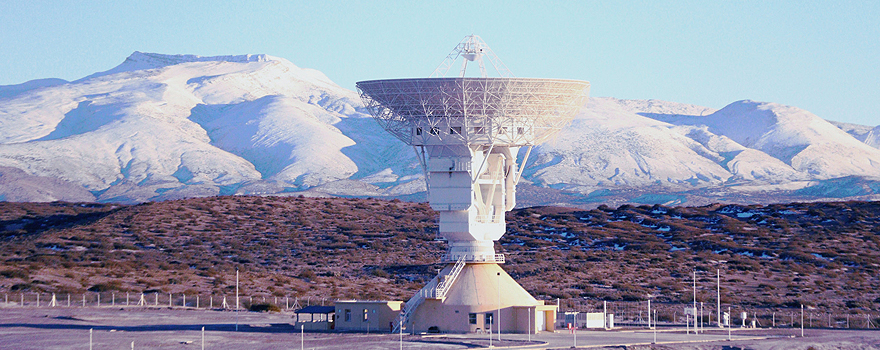
Chinese space station in the Argentinean province of Neuquén [Casa Rosada] ▲ Chinese space station in the Argentinean province of Neuquén [Casa Rosada].
article / Naomi Moreno Cosgrove
After years of gradual economic penetration, which has led it to become the leading commercial partner in several South American countries and a major lender and investor throughout the region, China's incursion into Latin America is no longer silent. The influence it has achieved in various nations - for example, it acquires almost 90% of Ecuador's oil exports and its credits have been essential for the subsistence of Venezuela and certain Brazilian public companies - means that China's activities are attracting special attention and its expansion is becoming increasingly clear.
China's growing power in Latin America is especially noted by the United States, although its own neglect of the region, sometimes presented as a consequence of its pivot towards Asia, has contributed to national governments' attempts to meet its needs by seeking other partners from reference letter.
Already suspicious of China's growing presence in the Americas, any activity in strategic fields such as security arouses particular suspicion in Washington. This has also been the case with moves made by Moscow, such as the siting of a station for the Russian Global Navigation Satellite System (Globalnaya Navigatsionnaya Sputnikovaya Sistema or GLONASS) in Managua (Nicaragua). The secrecy surrounding the operation of the facility has caused mistrust among the population itself, raising suspicions as to whether its use is intended solely to provide a higher quality of the Russian navigation system or whether there is the possibility of strategic exploitation by Russian aerospace defence forces.
Negotiation
Suspicions about the so-called Far Space Station, the Chinese National Space Administration (CNSA) station in Patagonia, in the province of Neuquén, stem from entrance from the fact that it was negotiated at a time of particular disadvantage for Argentina, due to the financial weakness of Cristina Fernández de Kirchner's government and its need for urgent credit. When Argentina was out of the international credit markets for having defaulted on nearly 100 billion dollars in bonds, the Asian country was a blessing for the then president.
In 2009, in the midst of the financial crisis, China sent representatives to Latin America to discuss an issue that had little to do with currency fluctuations: Beijing's space interests. This was due to China's desire to have a centre in the other hemisphere of the globe that could support its space activity, such as the expedition to the far side of the moon.
After months of negotiation under great secrecy, the Chinese government and the government of the province of Neuquén signed a agreement in November 2012, giving China the right to use the land - rent-free - for fifty years. The technical agreement was signed by the Chinese state-owned business Launching Security and Control Satellite (CLTC) and the Argentinean National Commission for Space Activities (CONAE).
Enormous in size, the larger of the two circular antennas - it is twelve stories high, weighs 450 tons and has a large diameter - and visible from a great distance due to its location in the middle of a desert plain, the station soon became an ideal target for controversy and suspicion. Fears that, in addition to its declared civilian use, it might also have a military purpose and be used to gather information by intercepting communications in that part of South America, fuelled the controversy.
After becoming Argentine president in 2015, Mauricio Macri entrusted the then foreign minister Susana Malcorra and the Argentine ambassador in Beijing, Diego Guelar, with the task of negotiating that agreement should include the specification that the station would only be used for peaceful purposes, which the Chinese accepted.
In spite of everything, the discussion about the risks and benefits of the Chinese base is still alive in Argentine public opinion. Politicians from civil service examination in Neuquén consider that "it is shameful to renounce sovereignty in your own country", as Congresswoman Betty Kreitman said when provincial legislators heard about project.
Beyond Argentina's borders, White House officials have called project a 'Trojan Horse', reflecting US concerns about the initiative, according to sources quoted by The New York Times. Even apart from any strategic dispute with the United States, some Latin American leaders have doubts and regrets about established ties with China, worrying that previous governments have subjected their countries to excessive dependence on the Asian power.
Confidentiality
The main questioning of the Chinese base, then, has to do with its possible military use and the possible existence of secret clauses. The latter have been the main cause of international suspicion, as Macri himself came to validate the existence of these clauses when they became a weapon against the Kirchner government, and promised to reveal them when he became president, something he has not done. However, the Argentine space authorities themselves deny any section secrecy.
Perhaps the misunderstanding can be found in the fact that the contract signed between the Chinese CLTC and the Argentinean CONAE states that "both parties will maintain confidentiality regarding the technology, activities and monitoring, control and acquisition programmes of data". Although confidentiality regarding third parties in relation to technology is a common internship , in this case it contributes to public mistrust.
Given that the CLTC reports to the Chinese People's Army, it is difficult to deny that the data it obtains will come under the domain of the Defence hierarchy and may end up being put to military use, although not necessarily for military purposes. Experts also say that antennas and other equipment used to support space missions, similar to those the Chinese have in Patagonia, are likely to increase China's intelligence-gathering capabilities. "A giant antenna is like a huge hoover. It sucks up signals, information, all subject of things," Dean Cheng, an expert on China's national security policy, was quoted as saying in the NYT.
